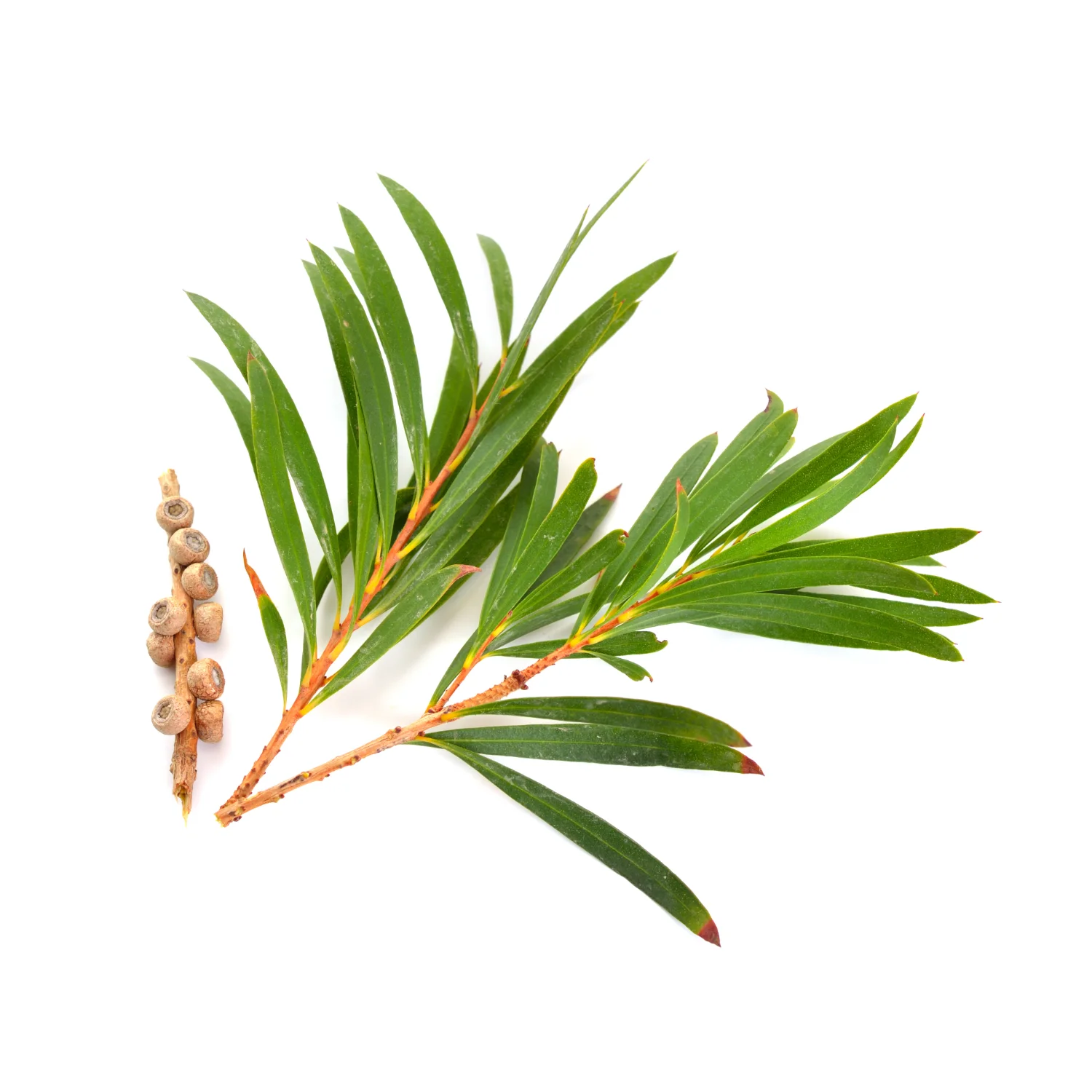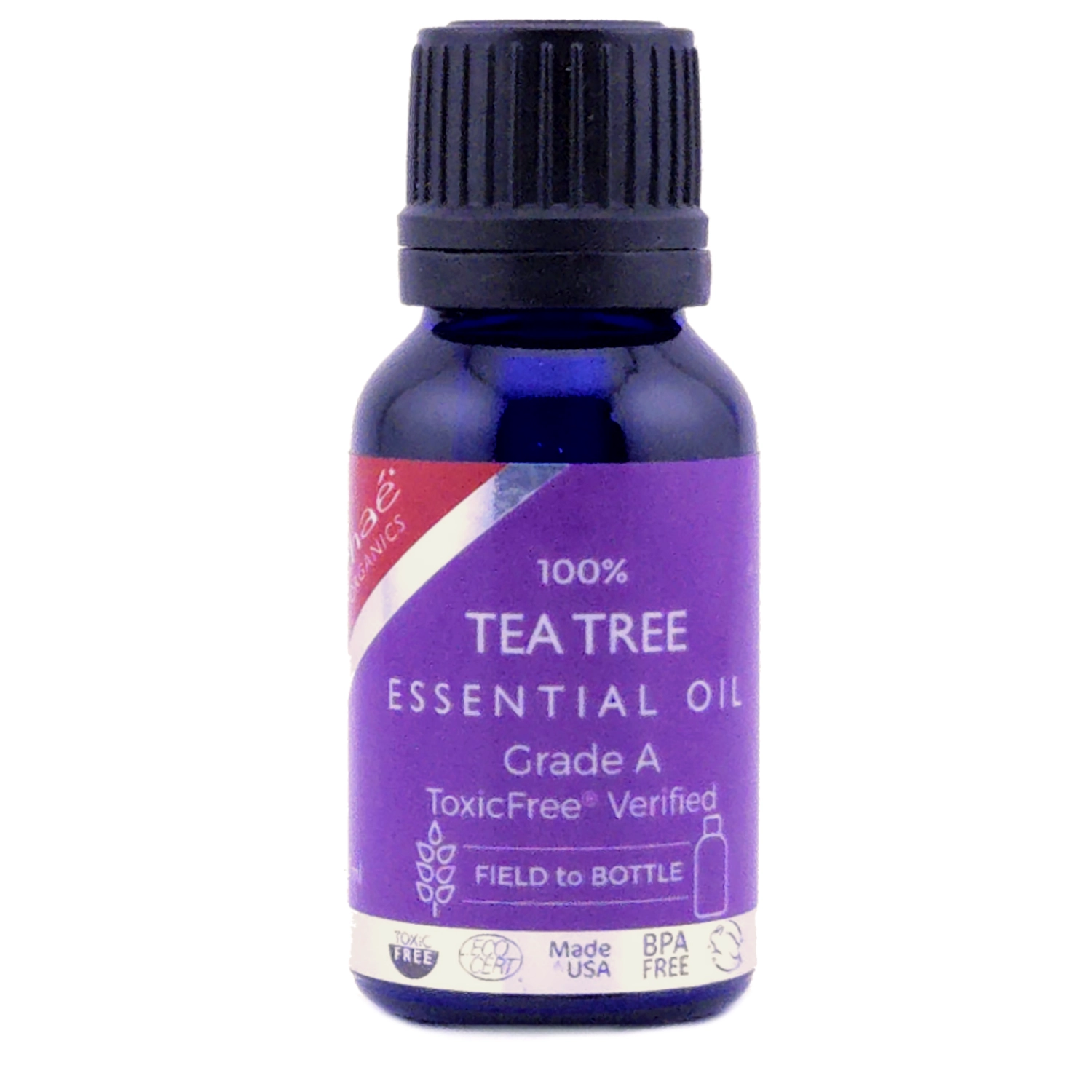
Benefits of Tea Tree Oil
What is Tea Tree Oil?
Tea tree oil, a potent extract from the Melaleuca alternifolia plant, has been a staple in traditional medicine for centuries. Indigenous to Australia, this plant’s leaves are steam-distilled to produce an essential oil with a myriad of health benefits.

In this article, we delve into the benefits of tea tree oil. We explore its antiseptic, anti-inflammatory, and antimicrobial properties, and how these can be harnessed for personal care and household use.
We also discuss how to blend tea tree oil with other essential oils for enhanced benefits. This can target specific issues, from skin conditions to respiratory problems.
We introduce Chae Organics Tea Tree Essential Oil, a high-quality product that allows you to experience these benefits firsthand.
Finally, we provide guidelines on how to use tea tree essential oil safely and effectively. This ensures you reap its benefits while minimizing potential risks.
The Origins and Composition of Tea Tree Oil
Tea tree oil originates from the leaves of the Melaleuca alternifolia, a plant native to Australia. The indigenous Bundjalung people have used this oil for centuries, recognizing its healing properties and incorporating it into their traditional medicine.
The oil is obtained through steam distillation of the plant’s leaves. This process yields a potent essential oil rich in terpinen-4-ol, a compound known for its antimicrobial activity. The oil’s unique composition contributes to its antiseptic, anti-inflammatory, and antimicrobial properties, making it a versatile natural remedy.
Topical Uses: Skin Care and Acne Treatment
Tea tree oil is a popular ingredient in skincare products, particularly those targeting acne. Its antimicrobial properties make it effective in combating the bacteria that cause acne. Additionally, its anti-inflammatory effects help reduce the redness and swelling associated with acne lesions.
A simple way to use tea tree oil for acne is to add a few drops to a carrier oil like jojoba or almond oil. This blend can be applied directly to the affected areas. Remember, a patch test is recommended before using tea tree oil topically to check for allergic reactions.
Tea tree oil can also be used to soothe other skin conditions. It may help alleviate symptoms of eczema and psoriasis due to its anti-inflammatory properties. Furthermore, it can be used to treat minor wounds and insect bites, promoting faster healing.
Here are some ways to incorporate tea tree oil into your skincare routine:
- Add a few drops to your facial cleanser or moisturizer.
- Make a homemade acne spot treatment by mixing tea tree oil with a carrier oil.
- Use it in a DIY face mask for deep cleansing and purifying effects.
- Create a natural body wash with tea tree oil for its antimicrobial benefits.
- Blend it with other beneficial oils like lavender or rosemary for a nourishing skin oil.
Hair and Scalp Health
Tea tree oil is a potent ally for hair and scalp health. Its antifungal properties make it effective in treating dandruff, a common scalp condition caused by an overgrowth of yeast. By adding a few drops of tea tree oil to your shampoo, you can keep your scalp healthy and free from flakes.
Moreover, tea tree oil can promote hair growth. It unclogs hair follicles and nourishes the roots. A simple hair growth serum can be made by mixing tea tree oil with a carrier oil like coconut or olive oil.
Lastly, tea tree oil can be used to treat head lice. Its insecticidal properties can kill lice and prevent their eggs from hatching. A few drops of tea tree oil can be added to a lice treatment shampoo for enhanced effectiveness.
Antimicrobial Properties: Wound Care and Sanitization
Tea tree oil is renowned for its antimicrobial properties. It can kill a broad spectrum of bacteria and viruses, making it a natural alternative to synthetic disinfectants. A few drops of tea tree oil can be added to a homemade hand sanitizer for an extra layer of protection.
In wound care, tea tree oil can be a game-changer. It not only disinfects the wound but also accelerates healing by reducing inflammation and increasing white blood cell activity.
Here are a few ways to use tea tree oil for wound care and sanitization:
- Add a few drops to a homemade hand sanitizer.
- Dilute with a carrier oil and apply to minor cuts and scrapes.
- Use in a homemade all-purpose cleaner for surfaces.
- Add to laundry detergent for antimicrobial cleaning.
Anti-inflammatory Effects: Soothing Skin Conditions
Tea tree oil’s anti-inflammatory properties make it a natural remedy for many skin conditions. It can soothe and reduce inflammation, providing relief from discomfort.
For instance, it can be used to soothe skin irritations and rashes. A few drops of tea tree oil, diluted with a carrier oil, can be applied to the affected area for relief.
Moreover, tea tree oil can also be used to soothe sunburns. When mixed with aloe vera gel, it can provide cooling relief and speed up the healing process.
Antifungal Applications: Treating Athlete’s Foot and Nail Fungus
Tea tree oil is known for its potent antifungal properties. This makes it an effective natural remedy for conditions like athlete’s foot and nail fungus.
For athlete’s foot, a few drops of tea tree oil can be mixed with a carrier oil and applied to the affected area. Regular application can help reduce the symptoms and prevent further spread of the fungus.
Similarly, for nail fungus, tea tree oil can be applied directly to the nail. It penetrates the nail, combating the fungus and promoting healthier nail growth.
Aromatherapy and Respiratory Benefits
Tea tree oil is a popular choice in aromatherapy for its calming and uplifting effects. When diffused, it purifies the air and eliminates airborne bacteria, creating a healthier environment.
In addition to its mood-enhancing properties, tea tree oil can also provide respiratory benefits. It can be used to treat sinus infections by adding a few drops to steaming water and inhaling the vapors. This can help clear congestion and soothe respiratory discomfort.
Moreover, during cold and flu season, diffusing tea tree oil can help strengthen the immune system. Its antimicrobial properties can help ward off illness-causing germs.
Blending with Other Essential Oils
Tea tree oil’s benefits can be enhanced when blended with other essential oils. This allows for targeted treatments for specific issues like congestion, stress, or skin conditions.
For instance, blending tea tree oil with eucalyptus and peppermint can create a powerful blend for respiratory relief. Similarly, combining it with lavender and chamomile can create a calming blend for stress relief.
Here are a few examples of essential oil blends with tea tree:
- For acne: Tea tree oil, lavender oil, and jojoba oil
- For stress relief: Tea tree oil, lavender oil, and chamomile oil
- For respiratory relief: Tea tree oil, eucalyptus oil, and peppermint oil
- For skin soothing: Tea tree oil, chamomile oil, and coconut oil
Remember, always dilute essential oils with a carrier oil before applying them to the skin.
Introducing Chae Organics Tea Tree Essential Oil
For those seeking a high-quality tea tree essential oil, Chae Organics Tea Tree Essential Oil is a recommended choice. This product is 100% pure, ensuring you reap the full benefits of tea tree oil.

Precautions and Best Practices for Using Tea Tree Oil
While tea tree oil is a potent natural remedy, it’s important to use it correctly to avoid adverse effects. One key precaution is to always dilute tea tree essential oil with a carrier oil before applying it to the skin. This helps prevent skin irritation.
Here are some best practices for using tea tree oil:
- Conduct a patch test before using it topically to check for allergic reactions.
- Never ingest tea tree oil due to potential toxicity.
- Store the oil in a cool, dark place to maintain its potency.
Remember, the benefits of tea tree oil are best experienced when used safely and responsibly.
Conclusion: Embracing the Versatility of Tea Tree Oil
In conclusion, the benefits of tea tree oil are vast and versatile. From skincare to home cleaning, this essential oil offers a natural solution to many everyday problems.
By incorporating tea tree oil into your routine, you can harness the power of nature to enhance your health and wellbeing.
Read more about our other Essential Oils and their many benefits:
https://www.chaeorganics.com/blog/take-control-of-your-health-and-wellbeing-with-essential-oils/
Purchase our very own Tea Tree Essential Oil:
https://www.chaeorganics.com/product/tea-tree-essential-oil/
